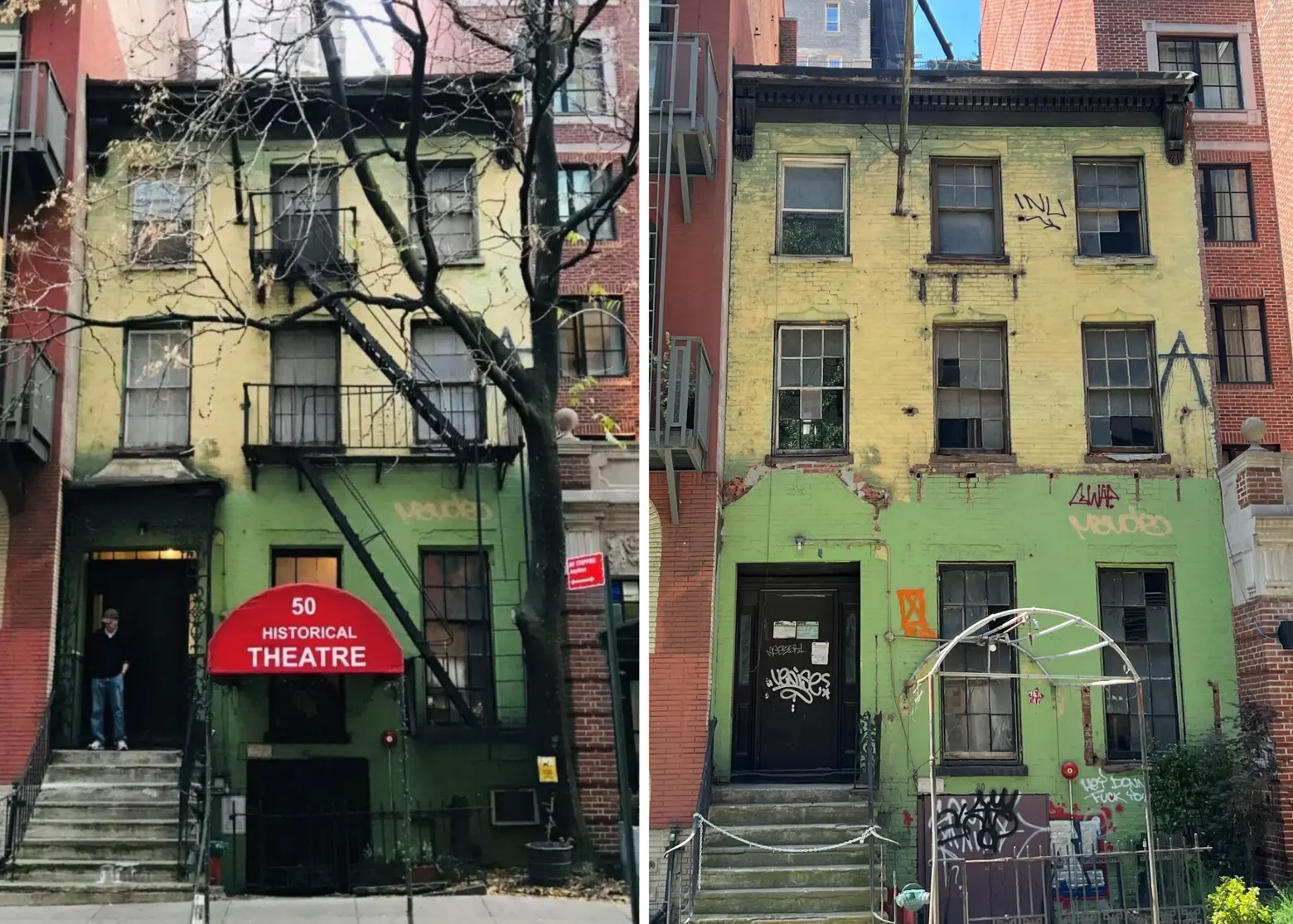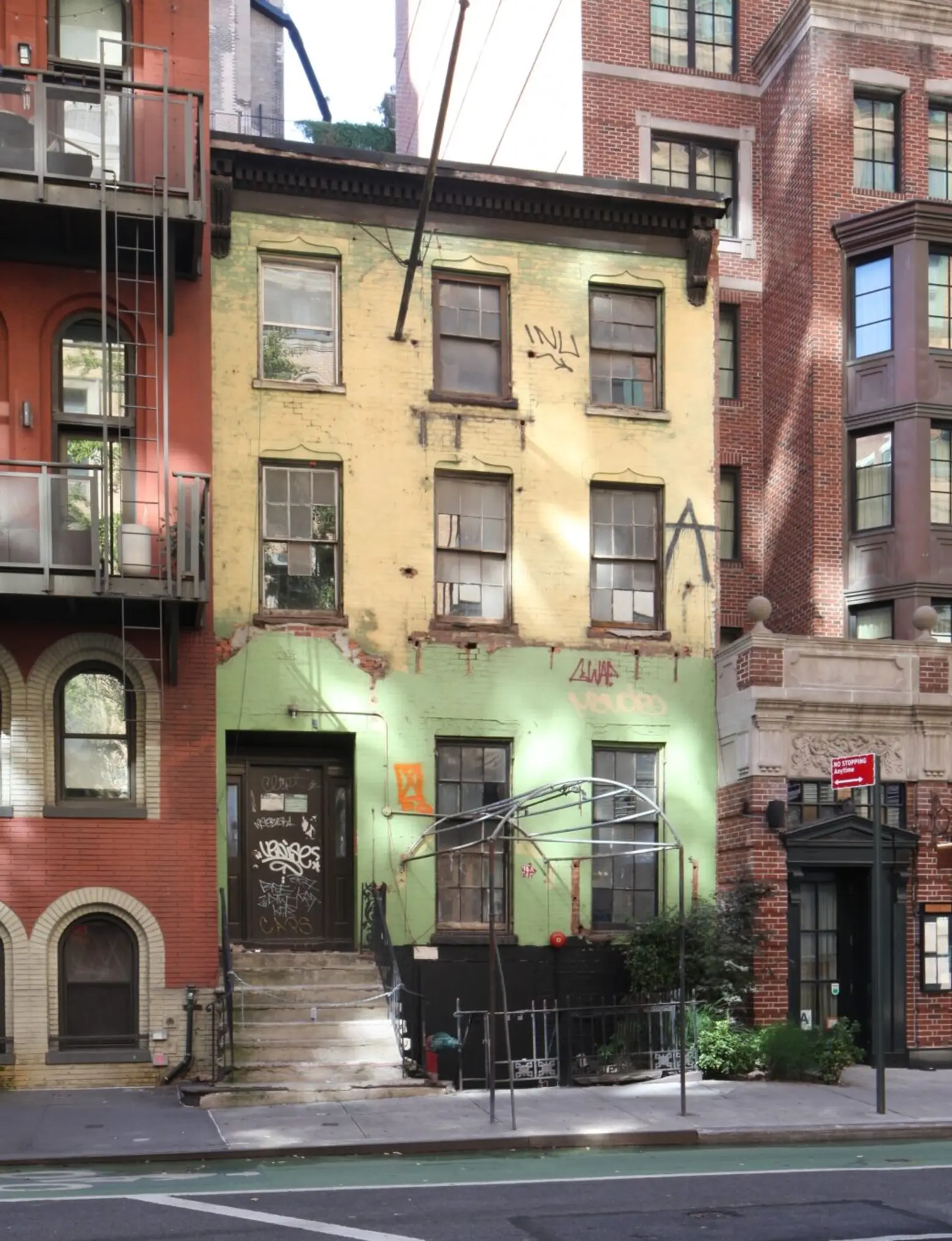
The 13th Street Repertory Company. Photo (left): Courtesy of Village Preservation. Current view of the building (right): Courtesy of the Landmarks Preservation Commission.
A Greenwich Village rowhouse, dating back to before the Civil War and closely tied to Black history and one of the city’s first “Off-Off-Broadway” theaters, is New York City’s newest landmark. The Landmarks Preservation Commission on Tuesday voted to designate the Jacob Day Residence at 50 West 13th Street. The 1845 rowhouse was home to Jacob Day, one of NYC’s most successful 19th-century African American businessmen, and the 13th Street Repertory Company, one of the city’s oldest Off-Off-Broadway theaters.

“The Jacob Day Residence is an incredible rare survivor of a 19th-century site with direct links to Abolitionist history and is significant in that it was owned by a Black businessman who was an abolitionist,” LPC Chair Sarah Carroll said on Tuesday. “That’s even more rare in the sites that we’ve been able to identify and designate.”
“It’s an important reminder of the critical role that members of the city’s Black community played in the fight for freedom and social justice, locally and nationally.”
The nearly 180-year-old, three-story Greek Revival-style brick rowhouse was home to Day from 1858 to 1884. Remembered as an abolitionist, civil rights advocate, and supporter of African American institutions, Day was one of the city’s wealthiest African American businessmen and a prominent real estate owner.
The building also housed the 13th Street Repertory Company, founded by Edith O’Hara in 1972. As one of the city’s first Off-Off-Broadway theaters, it helped launch the careers of Bette Midler, Chazz Palminteri, Richard Dreyfus, and Barry Manilow, among others. After O’Hara died in 2020, Village Preservation began a campaign to save the building from demolition.
Born in 1817, Day worked as a waiter and saved up enough to start his own catering business, gradually working his way up to become one of the wealthiest Black New Yorkers of his time, with a net worth of roughly $200,000 at the time of his death, equivalent to $6 million today, LPC Staff Theresa Noonan said during a June LPC hearing.
At the time, catering was one of the few business opportunities available to the Black community. Day was a member of the Caterer’s Club, established after the Civil War to enhance the economic prospects of African Americans, according to the LPC.
Day was a staunch advocate of Black civil rights, and while it is not confirmed, historians believe he played an active role in helping enslaved people escape north via the Underground Railroad.
Evidence that hints at this includes Day meeting with leaders of the Underground Railroad for at least 26 years, and his name appearing on a document showing land grants in the Adirondack region of upstate New York by Gerrit Smith, a major figure in the Underground Railroad, according to the New York Times.
Day also later owned properties in Brooklyn and Long Island. Additionally, a trap door located in the theater’s dressing room leads to a hidden space unconnected from the rest of the basement.
He was also a member and longtime treasurer of the Abyssinian Baptist Church, the second oldest Black church in NYC, and had an account at Freedman’s Savings Bank, an institution founded to help former slaves after the Civil War.
From 1866 to 1874, during a major point in her career, renowned suffragist, educator, and Civil Rights leader Sarah Tompkins Garnet lived in the building as part of Day’s household. Tompkins was one of the first Black women to become a principal in the city’s school system.
In 1958, the property was converted from a store and manufacturing space into a theater located in the basement and first floor. The first theater was called the Washington Players Studio, which was formed at the beginning of what was called the “Off-Off-Broadway” movement.
The theater offered monthly plays and acting classes and later hosted the Afro-American Folkloric Troupe, which presented poetry, prose, and folklore, in 1968, according to Village Preservation.
The 13th Street Repertory Company was founded by O’Hara in 1972 and stayed open until her death in 2020. The theater was well-known for giving a platform to emerging talents and allowing actors and writers to work in an uninhibited atmosphere.
For example, “Boy Meets Boy,” the city’s first gay musical, was rejected by other producers in NYC but was given a chance by O’Hara.
Village Preservation began its preservation campaign after O’Hara’s death. The commission initially told the group that despite its historical integrity, the rowhouse was not qualified to receive landmark protection for its architecture. Village Preservation researched the building to prove it’s worthy of landmark status, not only for its theatrical history but also for its connection to Black history.
The group also gathered thousands of letters of support for landmark designation from New Yorkers, elected officials, and those who are interested in preserving Black, women’s, and theater history across the United States.
The property has fallen into disrepair over the past 15 years due to a lack of funding, another factor behind the urgency for landmarking. The building is currently owned by White Knight Ltd, a little over a third is owned by O’Hara’s three children, and the remainder by Stephan Loewentheil, a bookseller, and his ex-wife, Beth Farber, according to the Times.
Following a years-long legal dispute, the O’Hara family and Loewentheil agreed to let the theater remain in place until O’Hara’s passing. After her death, the building’s fate was uncertain.
“Watching conditions at the building deteriorate for years, and the owner purposely strip historic 19th-century architectural features while the city refused to act, has been painful,” Andrew Berman, executive director of Village Preservation, said. “We’re hopeful that landmark designation will stem the tide of deterioration at the building, and 50 West 13th Street will ultimately be restored to the condition it deserves.”
“The house’s designation provides long-overdue recognition to Jacob Day’s inspiring work in the 19th century to abolish slavery and achieve equality for Black New Yorkers, Sarah Smith Garnet’s work in the 19th century to fight racism and advance women’s suffrage, and to 13th Street Repertory owner Edith O’Hara’s work in the 20th century to provide a platform for creative expression that eschewed the mainstream and transformed theater.”
The LPC offers an interactive story map, New York City and the Path to Freedom, for those interested in exploring additional landmarks linked to abolitionist history across the five boroughs.
LPC voted to calendar the building for potential designation in June.
RELATED:



